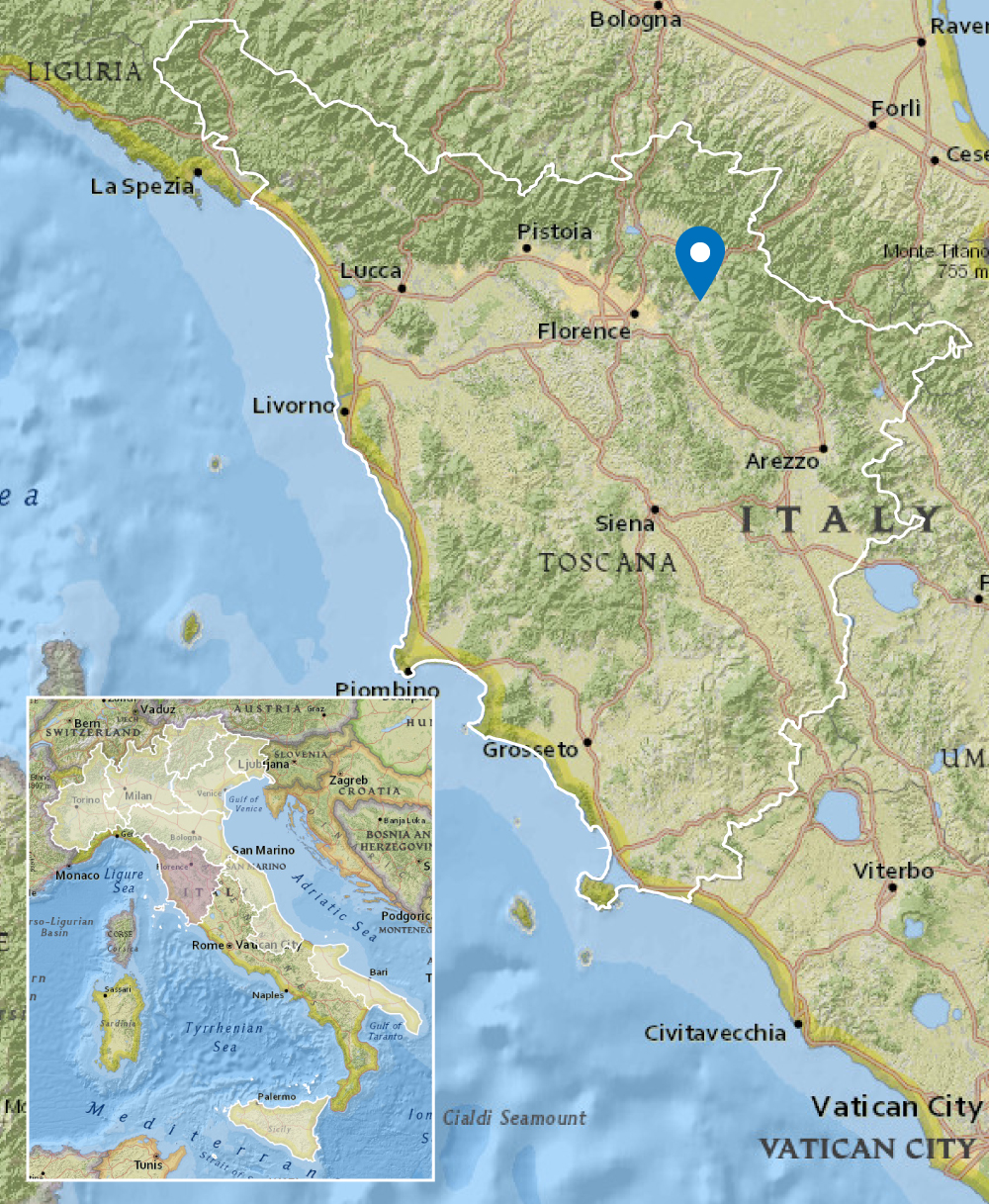| WINERY NAME: | SELVAPIANA |
| WINERY LOCATION: | Rùfina (suburb of Florence), Tuscany |
| VINEYARD LOCATION: | Rùfina subzone of Chianti, Tuscany |
| VINEYARD LAND: | 145 acres (60 ha) |
| FARMING PRACTICES: | Sustainable & Organic |
| GRAPE VARIETIES: | Sangiovese; smaller amounts of Cabernet Sauvignon, Canaiolo, Colorino, Malvasia Bianca, Malvasia Nera, Merlot, and Trebbiano Toscano |
| WINE STYLES: | Dry red; dry white; sweet dessert |
| WINE REGIONS: | TUSCANY |
| TOTAL WINE PRODUCTION: | 300,000 bottles (225,000 liters) |
| YEAR FOUNDED: | 1827 |
| OWNER(S): | The Giuntini Family |
| WINEMAKER(S): | Federico & Nicolo Giuntini with consultant Franco Bernabei |
During the 17th and 18th centuries, England and France were frequently at war with each other, which among other things meant that England was periodically cut off from its usual sources of wine across the Channel. Looking farther afield, they found substitutes for their French clarets in far-away Tuscany. The market for Chianti and other Tuscan wines grew and brought in significant revenue, to the point that Grand Duke Cosimo III de’ Medici, ruler of Tuscany for more than 50 years beginning in 1670, realized that this market sector needed some regulation to protect its value. Therefore, in 1716, he issued a bando (decree) that defined exactly which parts of his realm were suitable for the production of its most renowned wines. Among the four areas that Cosimo elaborated was a zone called Pomino.
Pomino is the name of a current wine denomination, but the Pomino region defined by Cosimo III was much larger—essentially the same as the Rùfina subzone of the Chianti DOCG today. Thus, Chianti Rùfina was one of the areas (along with Chianti Classico, Carmignano, and Val d’Arno di Sopra) defined in the world’s earliest-known denomination protection law. It celebrated the bando’s 300th anniversary in 2016.
Selvapiana is among the best-known and most respected of the two dozen growers in Rùfina—the smallest subzone of Chianti—and as it happens is also one of only two wineries to produce wine from the tiny Pomino DOC. The Selvapiana winery, like all of Chianti Rùfina, lies close to the Sieve River, a tributary of the Arno upriver from Florence. The air is cooler and cleaner here than in the city, which is why these hills have long been a retreat for aristocrats escaping Florence’s summer heat. During the Renaissance, one noble Florentine family constructed the Selvapiana residence by enlarging a medieval watchtower that was one of the outposts guarding Florence from invading enemies.
For centuries, the house was the summer home of a series of wealthy city dwellers, including bishops of Florence. Its modern history began in 1827, when banker Michele Giuntini Selvapiana bought the property. Ownership passed down through his descendants to the current owner, Francesco Giuntini Antinori, representing the fifth generation of family ownership. With the assistance of consulting enologist Franco Bernabei beginning in 1978, Selvapiana was among the first Tuscan producers to make a Chianti Riserva from 100% Sangiovese (1978) and to produce a single-vineyard wine (Bucerchiale 1979).
With no children of his own to leave the estate to, Francesco adopted the two children of his estate manager of almost 40 years, Franco Masseti. Federico and Silvia Giuntini Masseti now continue the family history, jointly running operations since 1997. In addition, Federico is the current president of the Chianti Rùfina consortium of producers.
Located in the western foothills of the Apennines, the Rùfina zone experiences a relatively cooler summer and also benefits from a wide day/night temperature excursion. This mesoclimate adds a certain elegance to the wines that is sought after by wine cognoscenti. The hallmark of Selvapiana wines is the longevity of its red wines. The old cellar contains bottles of the Riserva back to 1948, and they remain in excellent condition. The winery opened a new vinification center in 2005, and while not officially certified, all the vineyards are farmed according to organic principles. Selvapiana has a world-class reputation for its Vin Santo as well at the olive oil they produce.
 |
WINES IN THE SELVAPIANA PORTFOLIO
· Selvapiana Chianti Rufina DOCG
· Selvapiana “Bucerchiale” Chianti Rufina Riserva DOCG · Selvapiana "Vigneto Erchi" Chianti Rufina DOCG Riserva Terrælectae · Selvapiana “Fornace” Toscana IGT · Selvapiana “Villa Petrognano” Pomino DOC · Selvapiana "Villa Petrognano" Pomino Bianco DOC · Selvapiana Vin Santo del Chianti Rufina DOC |

